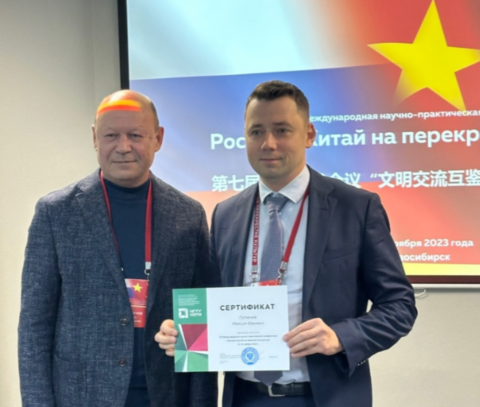The 7th International Science-to-practice Conference of China-Russia: On the Crossroads of Cultures took place at Novosibirsk State Technical University November 9th through November 10th.
The conference was organized by the NSTU Training Centre of Confucius Institute, the Department of International Relations and Regional Studies of NSTU, the Institute of China and Contemporary Asia of the Russian Academy of Sciences, the International Relations Department of the Administration of the Governor of the Novosibirsk Region and the Government of the Novosibirsk Region, and Dalian University of Foreign Languages.
More than 80 scientists and experts from Russia and China took part in the conference. Russia was represented by staff members of scientific and educational institutions of Moscow, St. Petersburg, Novosibirsk, Tomsk, Krasnoyarsk, Barnaul, Kemerovo, Ulan-Ude, Yekaterinburg, Yoshkar-Ola, and Chelyabinsk. China was represented by Chinese Academy of Social Sciences, Beijing Language and Culture University, Beijing Normal University (Beijing), Shanghai Institute of Political Science and Law, Fudan University (Shanghai), Dalian University of Foreign Languages (Dalian).
A wide range of topics related to comprehensive cooperation between Russia and friendly China were discussed at the conference.
South Ural State University was presented by Maksim Gutenev, Associate Professor of the Department of International Relations, Political Science and Regional Studies. He gave a report on the Arctic Scientific Diplomacy of the PRC in the 21st Century. Participation in the conference was made possible due to the support of the Russian Science Foundation (RSF) grant No. 22-28-20276 and a grant from the St. Petersburg Science Foundation in accordance with agreement as of April 14, 2022 No. 38/2022 on the topic of The Role of St. Petersburg in the Development of the Arctic Science Diplomacy of the Russian Federation, being executed by Maksim Gutenev.
The aim of the project is to develop an optimal model of the Arctic science diplomacy (ASD) in St. Petersburg, relying on the experience accumulated by the scientific and educational institutions of the city in this area. At the moment, we are in the 2nd year of working on the project jointly with scientists from South Ural State University and St. Petersburg State University.
Cooperation between the SUSU and St. Petersburg State University scientists has a fairly long and very successful history. The team has published a series of scientific papers in Russian and English in Russian and international highly ranked journals.




